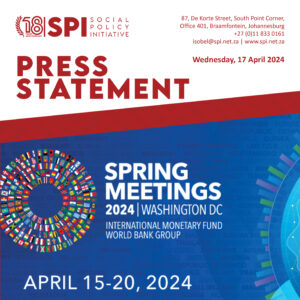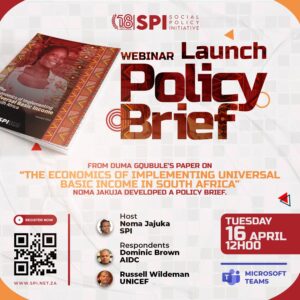
At their annual meeting, the Southern African Quaker Community voted in support of the introduction of a universal basic income for all people legally in South Africa. Here they explain the reasons behind the resolution.
We are in a crisis in South Africa – an emergency that needs an urgent response. We cannot carry on as normal or there will be dire consequences.
It is common cause that South Africa experiences high unemployment, inequality and extensive poverty. The threat this poses to the stability of South African society and the economy is seen every day in high levels of crime, gender-based violence, protest action, the wholesale theft of infrastructure, increases in mental health problems, reduced levels of trust and large numbers of skilled people of all races wishing to raise their children elsewhere.
The poverty-stricken masses have nothing going for them, see no hope for their future, and have nothing to lose. South Africa is a tinderbox that will catch fire if a match is thrown into it, as happened during the Durban riots in July 2021.
South Africa may be considered a real-world example of where the world is going. Globally, quality employment, or indeed any employment, is becoming an ever-scarcer commodity, and inequality is deepening hugely. Economic growth, job creation and wage work are becoming a less and less likely prospect of providing a solution to unemployment, inequality and poverty.
In South Africa we have demonstrated an inability to reverse this trend – so the crisis deepens.
What should we do?
As Quakers in southern Africa, we embrace the principles of Ubuntu. We seek solutions that recognise the interdependence of all our citizens, that each person is worthy of dignity, being recognised, being heard, and that we have a collective responsibility to ensure that all members of our communities have the means of subsistence; and we must do so as soon as possible.
In the spirit of Ubuntu, we believe that to make a rapid difference to our current crisis levels of large-scale poverty, we need to implement a universal basic income (UBI) for all people legally in the country, regardless of age, gender or income as soon as is practicable.
This should be done in the context of a strong public sector delivering quality basic services, infrastructure and institutions, providing programmes targeted at supporting micro, small and medium enterprises, and introducing active labour market policies including training and development, life-long learning and access to labour markets, so as not to obviate the state’s responsibility to provide an enabling environment for inclusive economic activity.
The possible benefits
A UBI would be a huge signal for the poor and dispossessed that their plight has been heard, and action has been taken. At a local level, both urban and rural, it will immediately give hope and dignity to each person. It will support better nutrition, improve access to education, allow people to set up small businesses and participate more fully in social and economic life.
Read more in Daily Maverick: Basic Income Grant — what it’s all about and what it could mean for South Africa
In pilot trials elsewhere, a UBI has been shown to increase happiness levels and improve both physical and mental health. It would also contribute to decreasing levels of crime and violence.
There is evidence that it strengthens demand in local and national economies, which would have a further positive impact if the increased demand was met by locally produced and more labour-intensive commodities. Increased economic activity and greater social stability would engender confidence in the country and stimulate both local and foreign investment.
A universal basic income is less intrusive than a social grant, as it allows each person to maintain their dignity.
Evidence internationally has shown it enables families to undertake economic activity that was otherwise not possible – it is an enabler of entrepreneurial activity that transforms people’s lives.
The Basic Income Grant (BIG) Pilot Campaign in Namibia introduced in January 2008 transformed the community of Otjivero, enabling small businesses (brickmaking, dressmaking, shoe repairing, bread baking, small spaza shops) to thrive. It led to the establishment of a local market by increasing households’ buying power.
The BIG resulted in a huge reduction of child malnutrition, school attendance and pass rates improved significantly and school dropout rates fell from almost 40% to 5% in seven months. The general health of residents improved since they could pay the small amount for clinic visits. Crime rates fell by 42%, stock theft by 43% and other theft by 20%.
Women were no longer so dependent on men, and were relieved of the burden of engaging in transactional sex. Most tellingly, the social fabric of the community was mobilised by an elected committee who advised residents on how to spend the BIG money wisely. It was overall of great benefit to the community.
Why a universal basic income and not social grants?
First, a universal basic income is less intrusive than a social grant, as it allows each person to maintain their dignity and avoids the humiliation involved in defining and proving poverty or any other criteria, and having to prove it to officials via access to your bank account.
Second, it eliminates the need for the vast, inefficient bureaucracy necessary to implement such criteria on potential recipients. This hugely reduces administration costs and also removes the possibility of corruption related to the officials controlling these payments.
A simple payout system could be via a smart ID card given to everyone who is a citizen or legal immigrant. If a person pays income tax, the money paid out in a UBI would revert to the state via SARS.
There is a difficulty: many see the UBI as basically worthwhile but may rather propose an unemployment grant, which is conditional. But in our view as Quakers, unconditional universality is pivotal.
First, this emphasises the equality and worth of all. Second, it avoids introducing a massive bureaucracy and associated procedures, often carried out by uncaring officials and involving lengthy waits in queues in the hot sun or freezing cold.
Furthermore, since it includes all in the family, including babies (registered at the hospital or clinic as soon as they are born), even a relatively small grant makes a real difference to a family as a whole, as it goes to all in the family. And it makes a profound difference to the communities where they live right across the country, because it goes to all families in the community. There is no stigma or envy associated with being included or left out.
Therefore, the ideal is a universal payment to each citizen and legal immigrant irrespective of age, gender or income. We do not want a means test which means your grant may be taken away. For a microeconomy to function well, it is really important to have a reliable income.
Affordability
A UBI is desirable, but is it affordable? The Quaker answer is that we cannot afford not to do it. However, we accept that the UBI might require incremental steps in implementation.
The question then becomes, how much? We propose that the UBI would be at least equivalent to the upper-bound poverty line. But the upper-bound poverty line is acceptable only if the South African public sector provides well-functioning healthcare, education with school feeding, water, electricity and refuse removal at an affordable rate, as well as infrastructure, safe transportation, security and public communication systems. Otherwise a higher level is necessary.
The Institute for Economic Justice has produced detailed models and calculations, and it proposes a number of possible financing sources, namely, taxing or raising taxes on resource rents, luxury goods, carbon emissions, wealth, dividends, estate duty, currency transactions, financial transactions; abolishing medical tax credits and retirement fund contributions for high income earners (more than R1-million per annum); cancelling employment tax incentives; reducing irregular and wasteful expenditure in the public sector; and reducing profit shifting by multinationals.
We recognise that a UBI is no panacea for South Africa’s woes. Much work needs to be done to create the Ubuntu vision of a peaceful, harmonious, and prosperous society.
Some countries and economists also propose a social wealth fund which is amassed through corporate dividends paid in recognition that wealth is socially produced and reliant on the expropriation of the commons.
Professor Alex van den Heever (Wits) has written two reports showing the UBI’s financial viability, and Hein Marais has done a detailed supportive study.
A key aspect of affordability is that the money raised and paid does not vanish from the economy. It is distributed across the country to every town, township and village and thereby stimulates the economy everywhere. Every small village will experience an economic revival due to the total monies received, as the Namibian experiment evidenced; and that leads to many social and health benefits. It can greatly boost the local economy.
Support for UBI
Support for UBI is widespread across many organisations. Among these are the trade union movement, the Department of Social Development, the Institute for Economic Justice, the Black Sash, the Studies in Poverty and Inequality Institute, the Climate Justice Charter Movement and the South African Food Sovereignty Campaign.
Crucially, Minister of Social Development Lindiwe Zulu strongly supports it. Consequently, the ANC approved a supportive statement at its December 2022 National Conference. Furthermore, the Western Province Council of Churches passed a resolution supporting it during its weekend conference in April this year.
While all these groups support some form of a universal basic income, they may differ in approach. As Quakers in southern Africa, we offer our support to all these voices, while holding strongly to our position of a UBI, of at least the upper-bound poverty line, unconditionally to be given to every citizen.
We recognise that a UBI is no panacea for South Africa’s woes. Much work needs to be done to create the Ubuntu vision of a peaceful, harmonious, and prosperous society. The UBI must be supported by changes across our regulatory framework that encourage entrepreneurship, and training and support in such activities should be made available.
Overall, as the Southern African Quaker Community, we urge the South African government, the private sector and the people of South Africa to be moved by the spirit of compassion and to act now to introduce a UBI and thus create an inclusive society. DM
By: Gregory Mthembu-Salter and Benonia Nyakuwanikwa
Source: Daily Maverick
Gregory Mthembu-Salter and Benonia Nyakuwanikwa, as co-Clerks, write on behalf of the Southern African Yearly Meeting of the Quakers.


